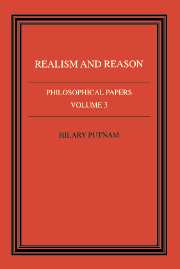Book contents
- Frontmatter
- Contents
- Dedication
- Introduction
- 1 Models and reality
- 2 Equivalence
- 3 Possibility and necessity
- 4 Reference and truth
- 5 ‘Two dogmas’ revisited
- 6 There is at least one a priori truth
- 7 Analyticity and apriority: beyond Wittgenstein and Quine
- 8 Computational psychology and interpretation theory
- 9 Reflections on Goodman's Ways of Worldmaking
- 10 Convention: a theme in philosophy
- 11 Philosophers and human understanding
- 12 Why there isn't a ready-made world
- 13 Why reason can't be naturalized
- 14 Quantum mechanics and the observer
- 15 Vagueness and alternative logic
- 16 Beyond historicism
- Bibliography
- Acknowledgements
- Index
8 - Computational psychology and interpretation theory
Published online by Cambridge University Press: 06 January 2010
- Frontmatter
- Contents
- Dedication
- Introduction
- 1 Models and reality
- 2 Equivalence
- 3 Possibility and necessity
- 4 Reference and truth
- 5 ‘Two dogmas’ revisited
- 6 There is at least one a priori truth
- 7 Analyticity and apriority: beyond Wittgenstein and Quine
- 8 Computational psychology and interpretation theory
- 9 Reflections on Goodman's Ways of Worldmaking
- 10 Convention: a theme in philosophy
- 11 Philosophers and human understanding
- 12 Why there isn't a ready-made world
- 13 Why reason can't be naturalized
- 14 Quantum mechanics and the observer
- 15 Vagueness and alternative logic
- 16 Beyond historicism
- Bibliography
- Acknowledgements
- Index
Summary
I once got into an argument after dinner with my friend Zenon Pylyshyn. The argument concerned the following assertion which Pylyshyn made: ‘cognitive psychology is impossible if there is not a well-defined notion of sameness of content for mental representations’. It occurred to me later that the reasons I have for rejecting this assertion tie in closely with Donald Davidson's well-known interests in both meaning theory and the philosophy of mind. Accordingly, with Zenon's permission and (I hope) forgiveness, I have decided to make my arguments against his assertion the subject of this paper.
Mental representation
Let us consider what goes on in the mind when we think ‘there is a tree over there’, or any other common thought about ordinary physical things. On one model, the computer model of the mind, the mind has a ‘program’, or set of rules, analogous to the rules governing a computing machine, and thought involves the manipulation of words and other signs (not all of this manipulation ‘conscious’, in the sense of being able to be verbalized by the computer). This model, however, is almost vacuous as it stands (in spite of the heat it generates among those who do not like to think that a mere device, such as a computing machine, could possibly serve as a model for something as special as the human mind). It is vacuous because the program, or system of rules for mental functioning, has not been specified; and it is this program that constitutes the psychological theory.
Information
- Type
- Chapter
- Information
- Philosophical Papers , pp. 139 - 154Publisher: Cambridge University PressPrint publication year: 1983
Accessibility standard: Unknown
Why this information is here
This section outlines the accessibility features of this content - including support for screen readers, full keyboard navigation and high-contrast display options. This may not be relevant for you.Accessibility Information
- 14
- Cited by
